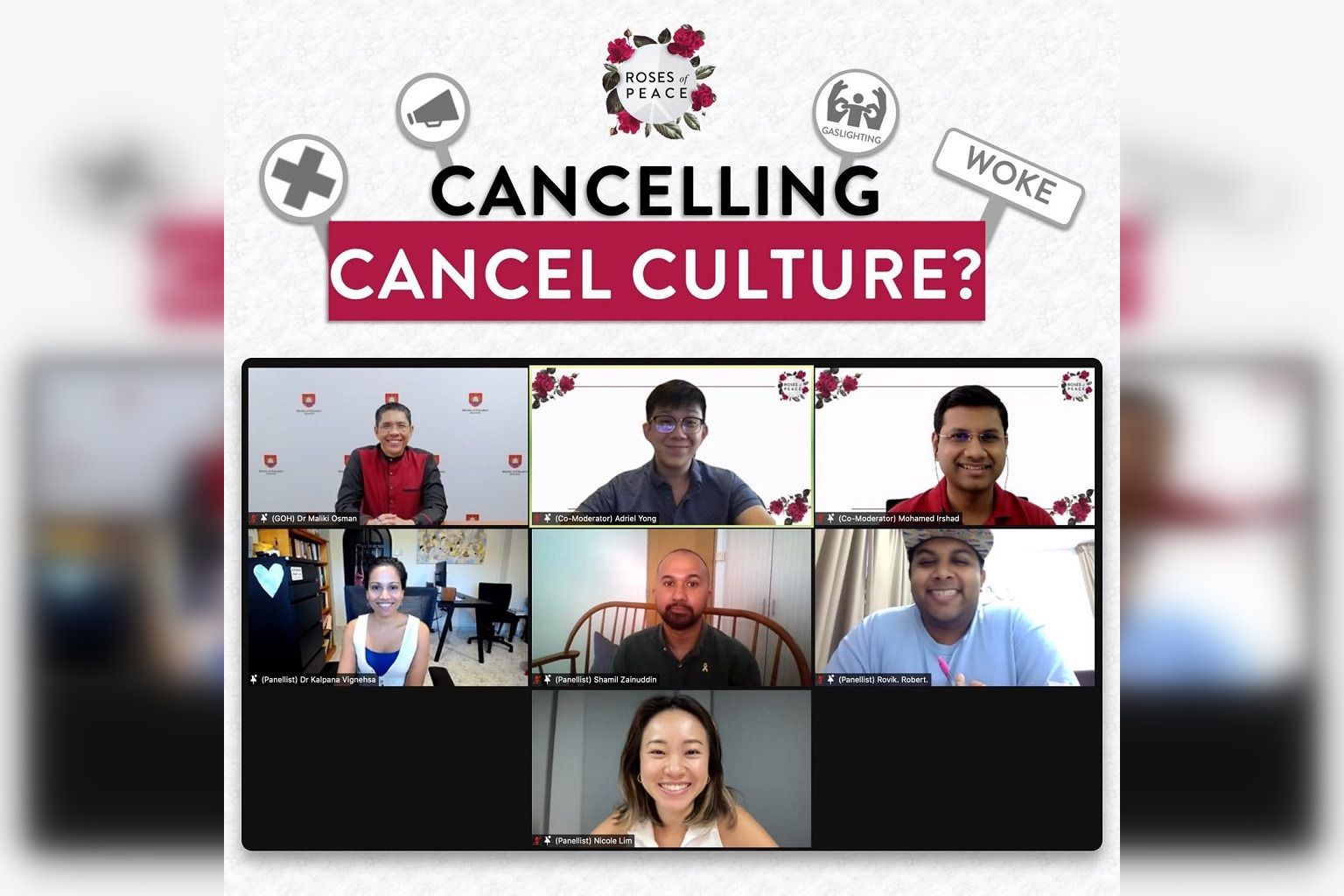Call out issues, not individuals, say panellists at dialogue on cancel culture
Sign up now: Get ST's newsletters delivered to your inbox

A virtual panel discussion where alternative approaches to "cancel culture" and "call-out culture" were put forth, which had Minister Maliki Osman as guest of honour.
PHOTO: DR MALIKI OSMAN/FACEBOOK
SINGAPORE - The first thing the neurologist said to Dr Kalpana Vignehsa, during a consultation for her chronic migraines, left her both stunned and furious.
"It's a little bit like you cannot do anything about your dark skin. I cannot do anything about your migraines," he told her.
Dr Vignehsa, a research fellow at the Institute of Policy Studies (IPS), went on Facebook to post about the incident which occurred in late 2018 - but without identifying the neurologist.
The result was a fulfilling discussion around the norms and expectations for medical practitioners, which acknowledged and validated her unpleasant experience while also helping others learn from an issue they might otherwise be unaware of.
"There is something to calling out the issue, as opposed to calling out the person… debating an idea, as opposed to debasing a person. Because a person is always more complex than just being a transgressor in one particular area," Dr Vignehsa said.
She was speaking on Sunday (Aug 15) at a virtual panel discussion organised by youth-led interfaith initiative Roses of Peace, which drew 76 participants.
Alternative approaches to "call-out culture" and "cancel culture" were put forth during the session - the second of a two-part dialogue series - which had Minister in the Prime Minister's Office Maliki Osman as guest of honour.
The first instalment on Aug 7, which featured Minister in the Prime Minister's Office Indranee Rajah, defined call-out culture as public critique for violating behavioural standards. Cancelling, meanwhile, involves boycotting an individual or brand altogether.
In his opening remarks, Dr Maliki urged Singaporeans to consider taking a step back to help an offending person reflect upon his mistake, with the aim of creating a more gracious society, rather than jumping in to call out or cancel them.
"We can help the said individual be aware of their words, their actions and how others might perceive them. This helps to defuse a potentially explosive situation, and turn it into a learning point for all," he said.
Dr Maliki also shared a personal anecdote of having to register his late mother's death at a police station, and being asked by an officer to confirm his choice of a burial and not a cremation.
"He was doing his job... But someone could easily take offence by saying, 'How could you have not known that cremation is a no-no for any Muslim?'," said Dr Maliki, who is also Second Minister for Education and Foreign Affairs.
Instead of "calling out" the officer, one could advise him to be more sensitive in future, and to apologise for any offence caused, Dr Maliki proposed.
Panellist and research associate Shamil Zainuddin, also from the IPS think-tank, wondered if the label of "cancel culture" was a way of dismissing people so as to avoid dealing with the issues at hand.
He echoed concerns raised by other speakers on the pitfalls of social media platforms in facilitating robust conversations on important issues.
"Sometimes, online discussions reduce people - for example, from the 280 characters you say on Twitter, suddenly you're racist and that's your 'master' label," said Mr Shamil. "It really essentialises identities to just that particular post."
Ms Nicole Lim, who hosts and produces the female-centric Something Private podcast, suggested that in navigating online spaces, it was also one's personal responsibility to seek out well-researched and well-positioned content.
"It's a learning journey for everybody, no matter how well informed you are. You do still have to constantly keep yourself up to date, and stay educated," she said.
Fellow podcaster Rovik Robert of the show SGExplained said call-out culture would remain relevant - and sometimes the only option - in scenarios where power imbalances exist.
"What I'm scared of is when people see that as the immediate move, rather than doing some of the work to actually have a conversation," said Mr Robert, who acknowledged that the ability to initiate such conversations also depended on levels of "trust, equity and visibility" accorded to people.
"Do I feel like I belong in a society now that respects me enough, where if I say something, it's not going to be disregarded?"


